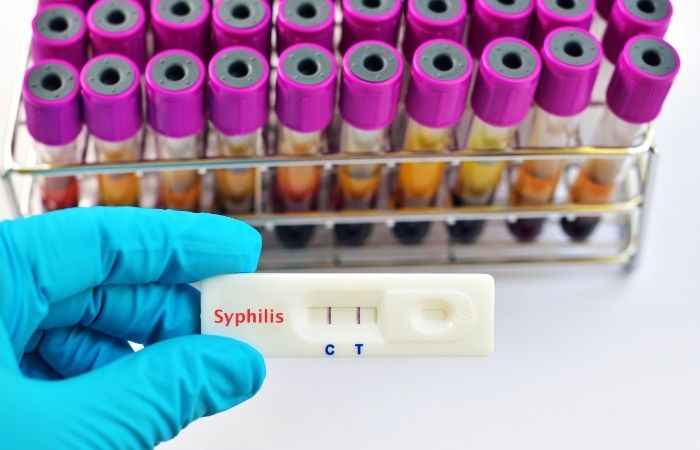UTI Symptoms That Turned Out to Be an STD
Quick Answer
Untreated STDs can lead to infertility, chronic pain, brain and organ damage, and even death in extreme cases. Many STDs have no symptoms, so testing is the only way to catch them early.
The Quiet Ones Are the Deadliest
Some of the most serious outcomes from STDs don’t come from raging symptoms, they come from the ones you don’t even know you have. These are the silent infiltrators.
- Chlamydia can quietly scar your fallopian tubes until pregnancy becomes impossible.
- HPV can simmer for years before turning into cervical or throat cancer.
- Syphilis can take a 10-year nap in your body, then wake up and eat your brain.
Most people don’t ignore treatment out of neglect. They ignore it because they have no idea they’re infected.

People are also looking for: Can untreated STDs cause cancer?
A Fertility Funeral: How STDs Steal Reproductive Futures
When Chlamydia or Gonorrhea is left untreated, especially in people with uteruses, it can lead to Pelvic Inflammatory Disease (PID). PID doesn’t sound scary, but it absolutely is. It's like setting a slow fire in your reproductive system. Scarring. Chronic pain. Blocked tubes. No obvious warning signs until it’s too late.
For people with testes, untreated Gonorrhea can trigger epididymitis, a painful condition that can shrink or shut down testicular function. That means fewer swimmers, or none at all.
And it’s not rare. According to the CDC, around 1 in 8 people with PID experience difficulty getting pregnant later in life.
When Syphilis Crawls Into the Brain
Let’s talk about Neurosyphilis, the creepiest plot twist in the STD world. Syphilis starts with a painless sore, disappears, then lurks. Years later, it can resurface as brain deterioration.
We’re talking:
- Memory loss
- Confusion
- Personality changes
- Vision loss
- Paralysis
This is not science fiction. It happened to people like Al Capone, who spent his final days in a mental haze caused by the same untreated infection that’s still circulating today.
Treatment? A few rounds of penicillin. But if you don’t test, you don’t know. And if you don’t know, you can’t stop it.
Order Now $129.00 $343.00 Check Your STD Status in Minutes
Test at Home with Remedium
7-in-1 STD Test Kit




For all 7 tests
The Herpes That Wrecked Her Mind
There’s a rare form of Herpes Simplex Virus (HSV-2) called Herpes Encephalitis. It travels from your genitals to your brain. Symptoms mimic a stroke or sudden psychosis, loss of coordination, hallucinations, seizures.
Is it common? No.
Is it possible? Absolutely.
But even the “milder” herpes stories carry long-term emotional weight. One anonymous woman shared her story on Reddit:
“I didn’t get tested for a while because I was scared. When I finally did, my outbreaks were constant. My doctor said earlier treatment would’ve kept it dormant longer.”
That’s the thing with Herpes, early antiviral use can delay or soften outbreaks. But you can’t treat what you don’t know you have.
The STD That Can Give You Cancer
HPV is incredibly common, and usually harmless. But some strains cause cervical, anal, penile, and throat cancers. The terrifying part? It can lie in wait for years.
Most people clear it on their own. But for some, that little virus turns into tumors, often without symptoms until it’s stage 3 or 4.
Pap smears, HPV testing, and now HPV self-swabs are the difference between silent progression and stopping it in its tracks.
Testing isn’t paranoia. It’s prevention.

People are also looking for: If I’ve had HPV or herpes, can I still get the vaccine?
The Heart Attack That Wasn’t: Gonorrhea’s Dirty Trick
It started as chest pain. For Marcus, 38, it felt like a panic attack or maybe indigestion. But the ER doctor didn’t find anything cardiac. What he did find, after a round of blood work and some surprise swelling in Marcus’s knees, was a case of disseminated gonococcal infection (DGI).
DGI is what happens when Gonorrhea breaks out of the genital tract and invades your bloodstream, joints, and even your heart valves. It’s rare, but more common in people who don’t know they’re infected.
Marcus’s gonorrhea wasn’t painful. He didn’t have discharge. No burning pee. Just a slow-moving infection quietly slipping into his joints and chest. A month later, his knees were still stiff and his doctor was furious.
“If we’d caught this two weeks earlier, it wouldn’t have spread past the urethra,”
Gonorrhea moves fast, but so does treatment. A same-day diagnosis and a round of antibiotics could have stopped the whole thing cold.
HIV: The Ghost That Doesn’t Knock
Unlike what pop culture led many to believe, HIV doesn’t scream its way into your life. It whispers. Fatigue, mild fever, maybe a rash you chalk up to something else.
The untreated progression?
- Years of subtle immune erosion
- Frequent infections and long recoveries
- Eventually, full-blown AIDS
But here’s the twist: modern HIV treatment works. Antiretroviral therapy (ART) can make the virus undetectable, and untransmittable. People who start treatment early often live just as long as those without HIV.
The worst-case HIV scenario is becoming rarer. But only if people get tested. Only if they know.
Check Your STD Status in Minutes
Test at Home with RemediumHIV Rapid Test Kit

 For Men & Women
For Men & Women Results in Minutes
Results in Minutes No Lab Needed
No Lab Needed Private & Discreet
Private & DiscreetOrder Now $33.99 $49.00
The STD That Ruined Her Kidneys
Let’s talk about Trichomoniasis, an STD that most people think of as “mild.” It’s common, often symptom-free, and easily treated. But in rare untreated cases, it can lead to chronic inflammation in the urinary and reproductive tract.
For one 28-year-old patient, a missed diagnosis turned into a multi-year battle with recurrent UTIs and kidney scarring. When doctors finally diagnosed her with trich, it had been over a year since her last test.
It wasn’t just about discomfort, it was about long-term damage that could’ve been stopped with a $30 test.
The STD That Lived in My Throat
Some STDs don’t live “down there.”
Oral gonorrhea and oral chlamydia are real, rising fast, and often missed.
For Sasha, 24, it meant constant sore throats. Multiple negative strep tests. A “phantom illness” that turned out to be gonorrhea in the back of her throat, silently sitting there, ready to pass to partners during oral sex.
Once she knew, the fix was simple: antibiotics and a bit of boundary-setting. But it took over six months and three doctors before someone thought to test for an STD.
How Bad Does It Get? It Depends on One Thing: Time
Almost every worst-case STD scenario has one thing in common: time.
The more time passes without diagnosis, the more chance the infection has to spread, burrow, and complicate.
- Time gave Chlamydia the chance to destroy fallopian tubes.
- Time gave HPV the chance to mutate cells into cancer.
- Time gave Syphilis the chance to reach the brain.
But when caught early, treatment is shockingly simple. Most STDs are curable or manageable with a single test and a round of meds.

People are also looking for: Can you really go blind from syphilis?
Real Stories, Real Relief
Here’s the hopeful side of the coin. For every horror story, there’s someone who caught it early and walked away with peace of mind and their health intact.
Jason, 29, found out he had HIV within a month of exposure.
“They told me I’d probably live a normal life. That was the best bad news I’ve ever gotten.”
Michelle, 32, got a surprise syphilis result during a routine test.
“I had no symptoms, but it was already in the secondary stage. Treatment worked, and now I test every six months, just in case.”
Tyrell, 40, found oral chlamydia during a full panel screen.
“I wouldn’t have known. No symptoms. But I was able to tell my partners and avoid passing it on.”
These aren’t miracles. They’re what happens when testing becomes normal.
FAQs
1. Can you have an STD for years and not know it?
Yes. Many STDs, like Chlamydia, HPV, and HIV, can live in your body for months or even years without showing obvious symptoms.
2. What’s the worst STD to leave untreated?
It depends on the person, but Syphilis, HIV, and high-risk HPV can cause life-threatening damage if ignored. Chlamydia and Gonorrhea can cause infertility.
3. Can an STD cause brain damage?
Yes. Late-stage syphilis can lead to neurosyphilis, which affects the brain and spinal cord, leading to memory loss, confusion, and personality changes.
4. Can men become infertile from STDs?
Yes. Untreated Gonorrhea or Chlamydia can cause testicular inflammation and damage sperm production, sometimes permanently.
5. Are there really STDs that can cause cancer?
Yes. High-risk strains of HPV are linked to cervical, anal, throat, and penile cancers.
6. Can I die from an STD?
It’s rare, but possible, especially with untreated HIV, syphilis, or HPV-related cancers. Most deaths are preventable with early testing and treatment.
7. Can you get an STD in your mouth or throat?
Absolutely. Oral gonorrhea, oral chlamydia, and herpes can live in the throat. Kissing and oral sex can transmit them.
8. Will I always have symptoms if I catch something?
Not at all. Many STDs are “silent” in the early stages. No symptoms ≠ no infection.
9. Can I test negative and still have something?
It depends on timing. Some STDs take days to weeks to show up on tests. That’s why follow-ups or repeat testing are sometimes necessary.
10. If I feel fine, should I still test?
Yes. Feeling “fine” doesn’t mean you're STD-free. Testing is the only way to know, and to protect yourself and your partners.
It Doesn’t Have to Get This Bad
STDs can do terrible things. That’s the truth. But almost every nightmare scenario in this article could’ve been avoided with one simple act: Getting tested.
This isn’t about fear. It’s about power. When you test, you take your health off autopilot. You get to choose what happens next. You get to protect your body, your relationships, your future. And you don’t even need to leave your house to do it.
Left untreated, even a 'mild' STD can change your life forever. Take back control today with the Multi-STD Essential Kit – 6 Tests, confidential, fast, and shipped discreetly.
Sources
2. What Happens if STDs Go Untreated? – Healthline
3. Long-Term Effects of STDs – Mayo Clinic










